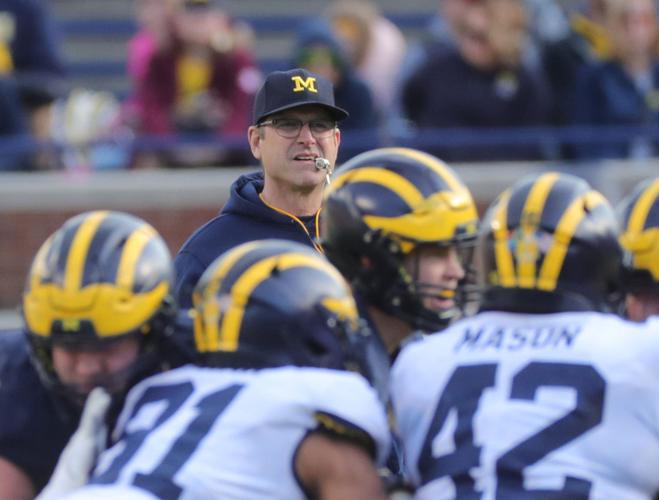Pac-12 Conference presidents and chancellors are set to meet Tuesday to possibly decide whether to cancel the fall football season because of the coronavirus pandemic.
Multiple outlets reported Monday that the Big Ten already had reached that decision — and that the Pac-12 would follow suit — but subsequent reports indicated otherwise.
No decisions had been made within the Pac-12 as of late Monday afternoon, but it seemed more likely than not that the fall season would be called off.
Thirteen FBS schools elected to cancel fall sports Monday, with the Mountain West Conference joining Old Dominion of Conference USA. Combined with similar announcements last week by the Mid-American Conference and independent Connecticut, one-fifth of the 130 FBS programs has opted out of the ’20 season.
It was less than two weeks ago, on July 31, that the Pac-12 released its revised all-conference schedule. Commissioner Larry Scott made no promises about the season but did say he was “cautiously optimistic” about its prospects.
A recent medical discovery might have changed the outlook for the conference — and could torpedo the fall season.
ESPN reported that myocarditis, an inflammation of the heart muscle, has been linked to COVID-19 and is “fueling concern among Power Five conference administrators.” The condition, which can be fatal if undiagnosed or untreated, had been found in “at least five” Big Ten student-athletes, per the report.
Brady Feeney, a freshman offensive lineman at Indiana, suffered “possible heart issues” after testing positive for COVID-19, his mother said in a recent Facebook post.
“He is still experiencing additional symptoms, and his bloodwork is indicating additional problems,” Debbie Rucker wrote. “Bottom line, even if your son’s schools do everything right to protect them, they CAN’T PROTECT THEM!!”
Pitcher Eduardo Rodriguez of the Boston Red Sox had to be shelved for the season after being diagnosed with myocarditis. Rodriguez, 27, tested positive for COVID-19 earlier this summer.
Other factors that could lead the Pac-12 and other leagues to cancel fall sports include the lack of a solution for high-intensity, high-contact activities, which could make athletes more susceptible to infection; the cost and practicality of regularly testing thousands of athletes; and the fact that the spread of the virus hasn’t subsided as much as administrators had hoped.
Big decisions
National radio host Dan Patrick reported Monday morning that the Big Ten and Pac-12 already had decided to cancel their seasons and would announce those decisions Tuesday. The Detroit Free Press reported that Big Ten presidents voted 12-2 Sunday to cancel the season, although Yahoo! Sports subsequently reported that no such vote had taken place. ESPN lead college football analyst Kirk Herbstreit, who attended Ohio State, tweeted that the Big Ten was looking to “delay” the season, not cancel it.
A spring alternative, once considered a last resort for college football, has been discussed by conference and school leaders. In announcing the “indefinite postponement” of all fall sports Monday, the Mountain West Conference said it would “begin to explore the feasibility of rescheduling fall sports competition, including the possibility of those sports competing in the spring.”
Monday’s announcements followed a push to play through social media Sunday night by prominent college football players, including quarterbacks Trevor Lawrence (Clemson), Justin Fields (Ohio State), Jayden Daniels (Arizona State) and Grant Gunnell (Arizona).
Thirty-six players publicly had opted out of the 2020 season because of health concerns as of Saturday, according to ESPN. The Big Ten had the most of any conference with 13, including Minnesota receiver Rashod Bateman, Purdue receiver Rondale Moore and Penn State linebacker Micah Parsons.
Those three are expected to be high picks in the 2021 NFL draft. A spring season would overlap with draft prep and likely would prompt most NFL hopefuls to end their college careers.
Michigan’s Jim Harbaugh was among several Big Ten coaches to speak out Monday in support of conducting a season.
Harbaugh cited data accumulated since UM players returned to campus June 13. Michigan has had 11 positive tests among 893 administered, according to Harbaugh – but none out of the last 353 and none among the coaching or support staffs.
“This isn’t easy. This is hard,” Harbaugh said. “It is proven that the conduct, discipline and structure within our program have led to these stellar results. We respect the challenge that the virus has presented; however, we will not cower from it.
“We have developed a great prototype for how we can make this work and provide the opportunity for players to play. If you are transparent and follow the rules, this is how it can be done.”
Nebraska’s Scott Frost, in a video news conference, hinted at the possibility of the Cornhuskers breaking away from the Big Ten to play if necessary.
“We’re prepared to look at any and all options,” said Frost, who also expressed the popular opinion among coaches that players are safer with their teams than anyplace else.
“A lot of schools around the conference probably feel the same way,” Frost said, “that the safest environment we can put these guys in is an environment where they’re being monitored constantly, being screened, being tested, being taken care of.”
Conference conflicts
The Big Ten last week unveiled a conference-only schedule that was supposed to make it easier for the league to pull off a season. The Pac-12 touted flexibility and continuity after releasing its revised schedule, which is supposed to start Sept. 26 and includes a pair of open dates.
The two conferences often have operated in lockstep, as longtime Pac-12 chronicler Jon Wilner noted Monday. He and others suggested a standoff could be forming, with the Big Ten and Pac-12 on one side and the ACC and SEC on the other. It’s not as clear where the other Power Five conference, the Big 12, stands in relation to its peers.
Speaking on behalf of his league Monday, SEC commissioner Greg Sankey tweeted that the best advice he’s received since the onset of COVID-19 is: “Be patient. Take time when making decisions. This is all new, and you’ll gain better information each day.”
He added that the SEC “has been deliberate at each step since March ... slowed return to practice ... delayed first game to respect start of fall semester ... developed testing protocols.”
“We know concerns remain,” Sankey said. “We have never had a (football) season in a COVID-19 environment. Can we play? I don’t know. We haven’t stopped trying. We support, educate and care for student-athletes every day, and will continue to do so.”
The University of Arizona continued its preparations for the delayed season Monday. Veteran players participated in a walk-through practice, lifted weights and met via Zoom. They started the 20-hour-a-week “summer access” program last Friday.
Wildcat newcomers, who arrived on campus the weekend of Aug. 1-2, began workouts and observed the walk-through from a distance.
Training camp could start later this month if the season isn’t canceled. The UA is scheduled to open against Arizona State on Sept. 26.





